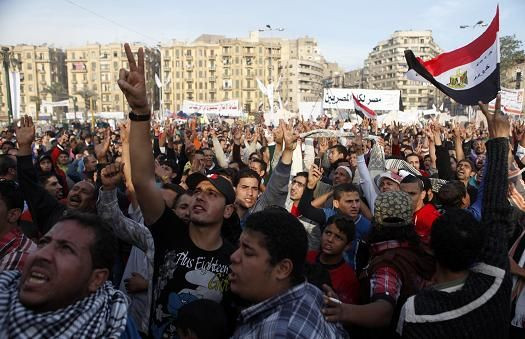Egyptian Protesters Injured As Molotov Cocktails, Tear Gas, And Stones Fly

After being chased from his presidential palace on Tuesday by a crowd of 10,000 protesters, Egyptian President Mohammed Morsi is back at work and still insisting that a constitutional referendum will still be held on Dec. 15, despite objections from much of the Egyptian public.
Thousands of protesters descended on the palace on Tuesday night, Al-Arabiya reported, throwing stones and chanting "The people want the downfall of the regime." Police fired tear gas at the protesters in response. 27 people were injured, the Egyptian daily Al-Masry Al-Youm reported.
Protests against Morsi, his new constitutional powers, and what is seen as an unbalanced Assembly stacked with the Muslim Brotherhood, were still ongoing on Wednesday evening local time all over Egypt, Al-Masry Al-Youm and Al-Ahram, the state-run news outlet, said. Clashes between pro- and anti-Morsi protesters outside the presidential palace began again at 4 p.m. local time, and by 7 p.m. there were Molotov cocktails flying.
Several judges have been on strike since Nov. 22, when Morsi announced he was assigning himself these sweeping new powers that prevented any laws he enacted from being challenged by the judiciary.
A committee representing a group of striking Egyptian doctors released a statement on Wednesday, demanding modification of article 62 in the draft constitution, which deals with health law and practices, Al-Ahram reported.
"The article does not mention if health services will be given to people without any discrimination; nor does it say it will offer medical treatment for all diseases. It only stated that it will be offered for emergencies," the statement said. "This will allow the state to offer the same deteriorating health services that are being provided now."
Egyptian Vice President Mahmoud Mekki told a press conference on Wednesday that the Dec. 15 popular referendum on the draft constitution will go ahead.
"We are keen to have the referendum on its scheduled date, to give into the judgment of the only legitimate judge, the people," Mekki said. "We need to reply [to] the people, the main source of authority, not [on] political camps and their ability to mobilize the streets."
However, it is expected that the majority of the judiciary who was supposed to supervise the referendum will refuse to do so, Al-Masry Al-Youm said. According to the head of the Judges Club, about 90 percent of the judges had refused to participate.
Not everyone is opposed to the referendum. In fact, one group, the Safety and Development Party, a political faction of Islamic Jihad that supports Morsi's Muslim Brotherhood, on Wednesday demanded that Morsi investigate and suspend the salaries of any judges who are boycotting the referendum, Al-Masry Al-Youm reported.
The party's leader, Mohamed Abu Samra, said that he was filing suit against the boycotting judges.
"They are hostile to the Islamic current," Samra told Al-Masry, "and they reject the president's legitimacy," adding that he was sure these judges were "carrying out a colonial and Zionist scheme to delay stability and destroy the state in order to secure the Zionist entity from the rising Islamic giant."
© Copyright IBTimes 2025. All rights reserved.





















